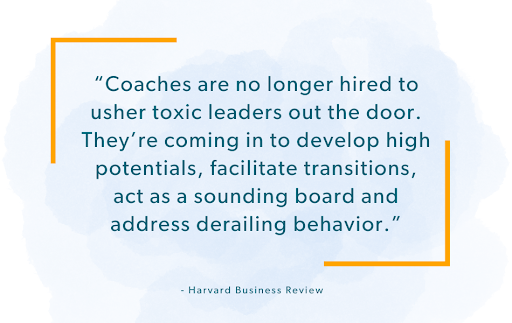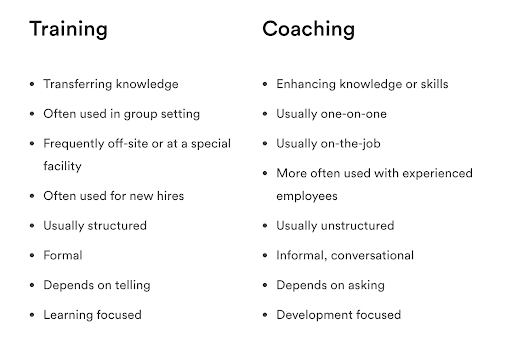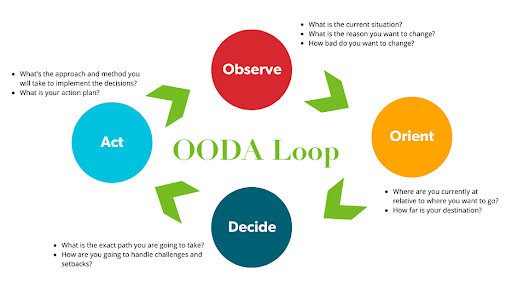The vast scale and complexity of an Agile transformation can be intimidating for many organizations. That’s why businesses that go Agile need a combination of training, coaching, and practical experience to fully transition and sustain their efforts.
In fact, Agile marketing coaching is a crucial part of that mix. Bringing in an expert Agile coach can boost agility, productivity, and teamwork, allowing you to get the most out of the methodology.
Along with the benefits that Agile brings, it also comes with roadblocks that almost no one can be prepared for. But when you encounter them, an Agile coach will spot chances for improvement, possibilities to streamline processes, and address issues that are harming the organization's effectiveness.
The balance between training and coaching is essential for successful and sustainable Agile transformation. Without guidance from coaches, there's even a danger that costly training efforts will stall out.
In this piece, we dissect the value of Agile coaches and why your business needs one to reach full-fledged business agility.
Agile Coach: Your Navigator in Unfamiliar Waters
Due to the complexity of Agile transformations, many organizations struggle to reach and sustain true agility. Training on the practices, principles, and values is absolutely necessary but still not sufficient to carry your teams to successful transformation. This is where the Agile coach comes in.
By hiring a coach, you’ll be able to support your teams in their development of Agile skills and mindset in a healthy and long-lasting manner.
Coaching ensures the Agile foundation team members gain through training is applied appropriately within the organization in practice. This is particularly important as business agility within functions like sales, finance, and human resources bears a fair amount of customization in order to fully address the process challenges in those functional areas. That’s why these units can especially benefit from an Agile coach to lead their transformations by being accountable to tailoring Agile best practices for their specific scenarios.
What is an Agile Coach
Consider an Agile coach as a guide on a complex and convoluted path for which there is no definitive map. Coaches have substantial, in-depth knowledge and experience about the Agile methodology in action, which they apply to shepherd teams through the various stages of the journey. Fostering an Agile culture requires a major organizational shift, and an Agile coach helps companies implement and sustain that shift.
Usually, Agile coaches step in after fundamental Agile training has occurred to ensure that the theory is put into practice. Depending on the Agile maturity within your business, you can bring in an Agile coach on a team level, in the C-suite for leadership coaching, or to support your middle management.
Their main responsibility is to arm each part of the business with the right tools and knowledge so that the organization as a whole can unlock the full potential of this new way of work.

What Agile Coaches Do
Agile coaches do different things depending on the organization’s goals and pain points. For example, a coach can be hired to manage a pilot project within an enterprise organization, mentoring one or two teams and concentrating on providing assistance to novice Scrum Masters and Product Owners.
Other Agile coaches may be hired to work at a more organizational level, advising the C-suite and adopting a company-wide approach to Agile. Sometimes even smaller businesses that are struggling to remain fully Agile as they scale will employ an Agile coach to coach their leadership through the period of growth.
Agile coaches help the organization adapt to the Agile cultural shift in addition to setting up as well as ramping up new Agile teams. They encourage employee and stakeholder buy-in in order to implement and scale the Agile methodology effectively.
Also, the Agile coach is an outsider who isn’t biased about your business. This can be one of the most effective advantages of bringing in a third-party to help champion change. When your organization is viewed through the lens of the coach’s previous experience and knowledge, they can highlight advancements and potential growth areas that an internal associate might easily dismiss.
The 70-20-10 Principle For Successful Agile Transformation
70-20-10 is a learning development model that ensures new knowledge gained from training is spread successfully among teams, and sustainably integrated throughout the business.
It is based on the belief that the best and most long-lasting learning is the result of 70% practical experience, 20% near-the-job learning (coaching), and only 10% structured learning.
In contrast to conventional approaches, the 70-20-10 model places more emphasis on what happens after training than on the number of hours invested in formal coursework.
This method of learning makes sure that teams begin with a share understanding of Agile theory, gather momentum through effective coaching, and then successfully adopt the Agile principles and values my embedding it into their own contexts.
Based on this model, the Agile coach's function is essential to supporting team through near-the-job informal training moments that strengthen team performance in the post-training phase. The team success depends on support from a professional who can help the team confidently make the leap from structured learning to on-the-job experience.
 Coaching Helps Your Organization Learn
Coaching Helps Your Organization Learn
As more organizations aim to become Agile, they’re coming to the realization that such a big change doesn’t happen overnight. That’s why they need a guiding figure that will navigate them through the process and help them reap the full benefits of business agility.
Coaching Enhances Knowledge & Skills
Professional Agile coaches typically have experience working with a wide range of businesses across various industries. Not only that, but with teams at all stages of development, and within diverse corporate cultures. Based on that extensive experience, an Agile coach will help you affirm what you’ve learned in training and enhance that knowledge and skills on every level of the organizational hierarchy.
The bottom line is that Agile coaches have probably seen it all so they can confidently step in to lead the way over, around, or through hurdles when an organization stumbles into roadblocks.
Supporting Leadership
In times of change, the support of and from leaders plays a crucial role in helping teams navigate unfamiliar waters. Getting one-on-one time with a knowledgeable mentor can prepare your future Agile leaders for their new responsibilities.
Leadership support is one of the factors that has the power to make or break your Agile transformation, so include them in your coaching strategy.
Immediate Application
Organizations trying to integrate Agile methodologies into their present workflow can get off to an excellent start with the help of a top-notch Agile training program.
However, teams are held accountable to immediately put what they've learned into practice and sometimes the pressure of this expectation (in addition to the expectation that regular work will still get done) can be too much.
With the help of an embedded Agile coach, teams can feel supported while creating positive habits immediately after training and therefore accelerate the transformation effort.
A successful coaching strategy will evaluate your team's Agile maturity and offer consistent recommendations on how to improve your Agile processes.
Coaching Has High ROI
Studies from the past ten years indicate that coaching has a very high return on investment (ROI). Organizations that invest in training alone experience a 22.4% increase in productivity. But, when combined with coaching, that figure rises to 88%, according to Gerald Olivero, Denise Bane, and Richard Kopelman in their article “Executive Coaching as a Transfer of Training Tool” from the journal on Public Personnel Management.
Coaching can improve business performance, employee motivation, and employee engagement. In fact, statistics from the U.S Bureau of Justice concluded that companies that combine coaching with training increase employee productivity by over 80%.
The Difference Between Training and Coaching
Agile training and coaching are better together. If you’re aiming to reach full business agility, you shouldn’t skip either. The goal of training is to spread knowledge so that a sizeable group of individuals can grasp a certain topic together, simultaneously.
On the other hand, the goal of coaching is to improve knowledge and skills in a field where there is already some foundational understanding.
Teams require a healthy mix of coaching and training to really master Agile application and achieve successful, long-lasting agility adoption.

Elements of Agile Coaching
The OODA technique, a cycle of observe-orient-decide-act, is one of the most effective frameworks for team coaching not just in the Agile context.
This technique, which was initially created by U.S. Army Command John R. Boyd, optimizes the effect of coaching by using it to confirm or deny our presumptions. It enables the group to act and learn in four recurring stages:
Observation: To find the most effective opportunities for improvement, the Agile coach observes the workflows, processes, team communications, decision-making procedures, etc.
Orient: Before the team commits to a goal, the coach helps them orient by gathering insights for better orientation. As a result, they’re able to formulate a hypothesis that will be validated or rejected.
Decide: Decide on a pragmatic goal or problem in order to act accordingly and solve the challenges given the context of the team.
Act: Act within the structured process and in accordance with the information gathered during earlier stages.

Sustaining Agility with the Help of an Agile Coach
As business units such as sales, finance, and human resources transform their processes and look for more Agile ways to do it, the role of the Agile coach only grows in importance.
As you progress toward true agility, your teams require precisely this kind of support to ensure that agility is applied to their daily activities, instead of staying theoretical.
In addition to teams, future organizational leaders also need ongoing coaching to help them learn to see opportunities for improvement through iteration. They depend more and more on coaches for guidance as the business environment they operate in becomes more complex.
The right kind of coaching can have an impact on team-level habits, but is also crucial to leadership's development throughout the Agile transformation journey.
The next time you find yourself in a structured training course, think about your next step. How will you leverage coaching to truly apply tomorrow what you're learning today?